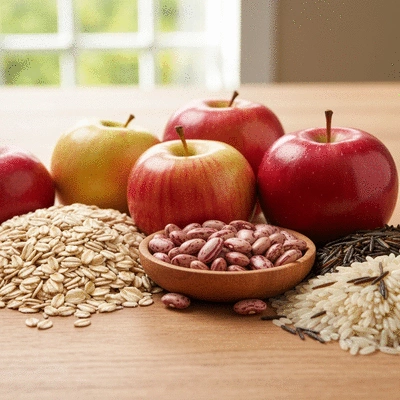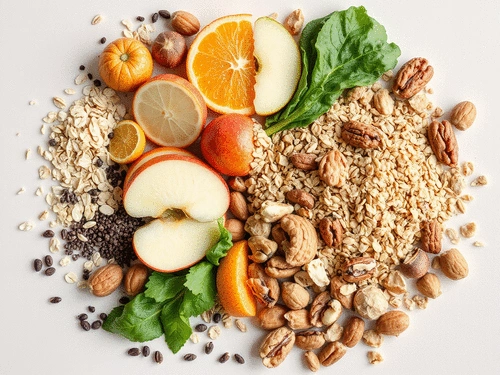Looking to enhance your digestive health? The key may lie in the fiber you consume! Discover the critical role dietary fiber plays in your body and how it can transform your well-being.
What You Will Learn
- Dietary fiber is essential for digestive health, aiding in regular bowel movements and preventing constipation.
- There are two types of fiber: soluble, which helps manage blood sugar and cholesterol, and insoluble, which promotes digestive regularity.
- Adequate fiber intake is linked to lower risks of heart disease, stroke, and certain cancers, supporting overall wellness.
- Incorporating a variety of fiber-rich foods into your diet can lead to enhanced gut health and effective weight management.
The Two Pillars of Fiber: Soluble vs. Insoluble
Understanding the distinct roles of soluble and insoluble fiber is key to optimizing your digestive health. Explore their unique attributes and benefits below.
Soluble Fiber
-
•
Dissolves in water, forming a gel-like substance.
-
•
Helps lower cholesterol and stabilize blood sugar.
-
•
Supports gut microbiome health.
-
•
Found in: Oats, beans, apples.
Insoluble Fiber
-
•
Does not dissolve in water.
-
•
Promotes regular bowel movements and adds bulk to stool.
-
•
Aids in digestion and prevents constipation.
-
•
Found in: Whole grains, nuts, vegetables.
Understanding Fiber: The Foundation of Digestive Health
As a gastroenterologist, I've seen firsthand how dietary fiber plays a crucial role in maintaining our digestive health. Whether you're dealing with heartburn, constipation, or other digestive issues, understanding fiber and its benefits can empower you to make healthier choices. So, what exactly is dietary fiber, and why is it important for our bodies?
Dietary fiber is a type of carbohydrate that the body can't digest. While other carbohydrates break down into sugar molecules, fiber can’t be digested. Instead, it passes through the digestive system relatively intact. This characteristic is what makes fiber essential for keeping our digestive systems functioning smoothly.
What is Dietary Fiber and Why is it Important?
Dietary fiber is generally categorized into two types: soluble and insoluble. Each type has its unique benefits and contributes to our overall health. But why should we care about fiber in the first place? Here are a few reasons:
- Regulates bowel movements: Fiber adds bulk to the stool, which helps to ease its passage through the intestines.
- Controls blood sugar levels: Soluble fiber slows down sugar absorption, which can help manage diabetes.
- Supports heart health: Fiber can help lower cholesterol levels, contributing to a healthier heart.
- Promotes satiety: Including fiber-rich foods in your diet can help you feel fuller longer, aiding in weight management.
At Heartburn Health Hub, I encourage my readers to focus on incorporating both types of fiber into their diets for optimal digestive health. The benefits are extensive, and they start with understanding what fiber truly is!
Types of Dietary Fiber: An Overview of Soluble and Insoluble
Let's dive a bit deeper into the two main types of dietary fiber. Soluble fiber dissolves in water and can be found in foods like oats, beans, and apples. It forms a gel-like substance in the gut, which helps with digestion and cholesterol levels. On the other hand, insoluble fiber does not dissolve in water. It’s found in whole grains, nuts, and vegetables, and it adds bulk to stool, promoting regular bowel movements.
Here's a quick overview of the distinctions between the two types:
- Soluble Fiber: Helps lower cholesterol and stabilize blood sugar.
- Insoluble Fiber: Aids in digestion and prevents constipation.
Both types of fiber serve important roles in your digestive health. Incorporating a mix of both can help you enjoy a more balanced diet and mitigate common digestive problems.

Health Claims Supported by Dietary Fiber: Evidence from Recent Research
Recent studies continue to back up the importance of dietary fiber in our diets. Research has shown that people who consume adequate fiber have lower rates of heart disease, stroke, and certain types of cancer. Additionally, fiber has been linked to improved gut health, which is essential for everyone, especially those affected by acid reflux and heartburn.
To help solidify the benefits of fiber, here are some promising findings from recent research:
- A study published in the American Journal of Gastroenterology found that increased fiber intake is associated with a lower risk of developing gastrointestinal disorders.
- Another research article highlighted the role of fiber in promoting a healthy gut microbiome, which is essential for digestion and overall wellness.
- Evidence suggests that fiber can help in weight management, making it a vital component for those looking to lose weight healthily.
Understanding these health claims can motivate you to prioritize fiber in your diet. It’s about taking those actionable steps toward a healthier, happier gut!
Pro Tip
To maximize the benefits of dietary fiber, aim to include a variety of fiber-rich foods in your meals. Combine fruits, vegetables, whole grains, and legumes in your diet to ensure you're getting both soluble and insoluble fiber. This not only enhances your gut health but also keeps you feeling fuller longer, making it easier to manage your weight.
Summarizing the Importance of Fiber in Digestive Health
As we wrap up our exploration of fiber, it's clear that it plays a crucial role in maintaining digestive health. Understanding the differences between soluble and insoluble fiber can empower you to make informed dietary choices. Both types offer unique benefits, and incorporating a variety of fiber-rich foods into your diet can lead to better health outcomes.
To summarize, here are the key differences between soluble and insoluble fiber:
- Soluble Fiber: Dissolves in water, helps to lower cholesterol, and supports gut microbiome health.
- Insoluble Fiber: Does not dissolve in water, promotes regular bowel movements, and adds bulk to the stool.
- Both types are essential for a well-rounded diet and can significantly improve your digestive health.
Frequently Asked Questions About Dietary Fiber
1. What is dietary fiber?
Dietary fiber is a type of carbohydrate that the body cannot digest. It passes through the digestive system relatively intact, contributing to regular bowel movements and overall digestive health.
2. What are the two main types of fiber?
The two main types are soluble fiber and insoluble fiber. Soluble fiber dissolves in water to form a gel-like substance and is found in foods like oats and apples. Insoluble fiber does not dissolve in water, adds bulk to stool, and is found in whole grains and vegetables.
3. What are the main benefits of consuming dietary fiber?
Consuming adequate dietary fiber helps regulate bowel movements, controls blood sugar levels, supports heart health by lowering cholesterol, and promotes satiety, which aids in weight management.
4. How does fiber impact gut health?
Fiber, particularly soluble fiber, supports a healthy gut microbiome by acting as a prebiotic, feeding beneficial gut bacteria. Insoluble fiber promotes regular bowel movements, preventing constipation and maintaining a healthy digestive tract. Research, including studies on the role of fiber in reducing inflammation, shows its positive impact on overall gut health.
5. Can I get all my fiber from supplements?
While fiber supplements can help increase intake, whole foods are generally preferred. Whole foods provide a broader range of nutrients, vitamins, and minerals that supplements often lack, offering more comprehensive health benefits.
Encouragement to Embrace a Fiber-Rich Diet: Steps to Improve Your Digestive Health
Now that you know how important fiber is, it's time to embrace a fiber-rich diet! Making small changes can lead to significant improvements in your digestive health. Here are some practical steps to help you increase your fiber intake:
- Start your day with a hearty bowl of oatmeal or whole-grain cereal.
- Snack on fresh fruits like apples, pears, or berries instead of processed snacks.
- Include legumes such as beans and lentils in your meals a few times a week.
- Add vegetables to your meals—think salads, stir-fries, or roasted vegetables!
- Gradually introduce new fiber sources to your diet to avoid any digestive discomfort.

Remember, at Heartburn Health Hub, we believe in the power of informed choices. Embracing a fiber-rich diet not only aids your digestion but also contributes to overall wellness!
Addressing Fiber Intake Myths: Clarifying Common Misconceptions
With so much information available, it's easy to fall prey to myths about fiber. Let's clear up some common misconceptions to help you feel more confident in your dietary choices:
- Myth: All fiber is the same. Truth: Soluble and insoluble fibers have different properties and benefits.
- Myth: You can take fiber supplements instead of getting it from food. Truth: Whole foods provide additional nutrients that supplements cannot.
- Myth: Increasing fiber intake will always cause digestive issues. Truth: Gradual increases in fiber can help your body adjust without discomfort.
By understanding these truths, you can confidently navigate your journey toward improved digestive health. As someone passionate about helping individuals manage their heartburn and digestive issues, I encourage you to incorporate more fiber into your daily meals.
Recap of Key Points
Here is a quick recap of the important points discussed in the article:
- Dietary Fiber Importance: Fiber is essential for digestive health, regulating bowel movements, controlling blood sugar levels, and supporting heart health.
- Types of Fiber: There are two main types of dietary fiber: soluble (helps lower cholesterol) and insoluble (promotes regular bowel movements).
- Health Claims: Adequate fiber intake is linked to lower rates of heart disease, stroke, and improved gut health.
- Practical Steps: Incorporate fiber-rich foods like oats, fruits, legumes, and vegetables into your diet gradually.
- Myth Busting: Understand that not all fiber is the same, and whole foods are preferable to supplements for fiber intake.










